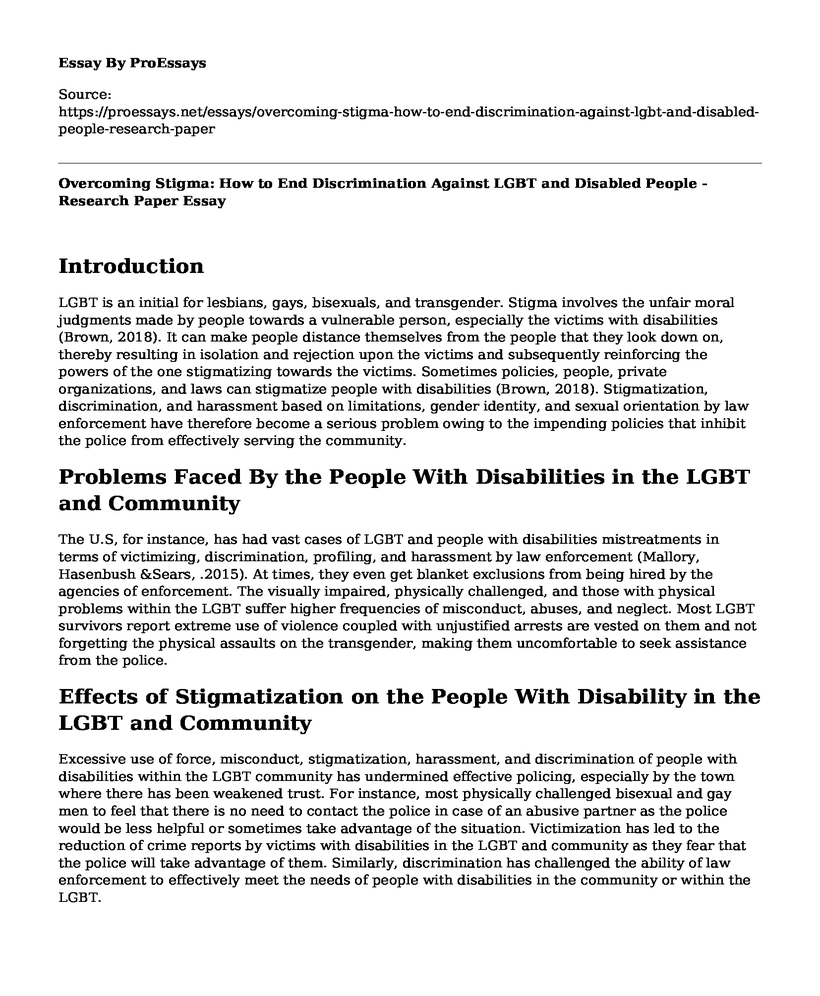Introduction
LGBT is an initial for lesbians, gays, bisexuals, and transgender. Stigma involves the unfair moral judgments made by people towards a vulnerable person, especially the victims with disabilities (Brown, 2018). It can make people distance themselves from the people that they look down on, thereby resulting in isolation and rejection upon the victims and subsequently reinforcing the powers of the one stigmatizing towards the victims. Sometimes policies, people, private organizations, and laws can stigmatize people with disabilities (Brown, 2018). Stigmatization, discrimination, and harassment based on limitations, gender identity, and sexual orientation by law enforcement have therefore become a serious problem owing to the impending policies that inhibit the police from effectively serving the community.
Problems Faced By the People With Disabilities in the LGBT and Community
The U.S, for instance, has had vast cases of LGBT and people with disabilities mistreatments in terms of victimizing, discrimination, profiling, and harassment by law enforcement (Mallory, Hasenbush &Sears, .2015). At times, they even get blanket exclusions from being hired by the agencies of enforcement. The visually impaired, physically challenged, and those with physical problems within the LGBT suffer higher frequencies of misconduct, abuses, and neglect. Most LGBT survivors report extreme use of violence coupled with unjustified arrests are vested on them and not forgetting the physical assaults on the transgender, making them uncomfortable to seek assistance from the police.
Effects of Stigmatization on the People With Disability in the LGBT and Community
Excessive use of force, misconduct, stigmatization, harassment, and discrimination of people with disabilities within the LGBT community has undermined effective policing, especially by the town where there has been weakened trust. For instance, most physically challenged bisexual and gay men to feel that there is no need to contact the police in case of an abusive partner as the police would be less helpful or sometimes take advantage of the situation. Victimization has led to the reduction of crime reports by victims with disabilities in the LGBT and community as they fear that the police will take advantage of them. Similarly, discrimination has challenged the ability of law enforcement to effectively meet the needs of people with disabilities in the community or within the LGBT.
Recommendations to Stop Discrimination and Stigmatization on People With Disabilities in the LGBT and Community
There should be the adoption of internal policies in both the local police department and the state on systems devoid of discrimination, coupled with the plans that do not tolerate harassment. Similarly, there should be respect for everyone's gender, strict policies on sensitivities to the people living with disabilities, and more specialized training on how to handle people with disabilities (Mallory et al., 2015). Additionally, there should be the adoption of federal-level protections to include nondiscriminatory policing services that are community-oriented. Additionally, the federal based protections should prohibit bias-based profiling that consists of the disabilities of people in the sexual orientations, gender identities, and in the community as a whole. Surveys through the police Bureau of Justice Statistics should also be done by anonymous people on the police that harass or seize those with disabilities, to gauge the cases of bias profiling against those with disabilities in the LGBT and the community. Finally, the existing legal protections on people with disabilities should be enforced with the inclusivity of promotions in the constitution, state, and local nondiscriminatory laws. They should also adopt new legal protections that prohibit harassment explicitly and discrimination of people with disabilities and their inactions at the state, federal, and local levels.
References
Brown, R. (2018, Feb).Understanding the Influence of Stigma and Discrimination for the Functional Discrimination Severity-Psychological Distress Relationship: A Stress and Coping Perspective .U.S.National Library of Medicine, National Institute of Health.Retrieved from doi.10.1016? j.ssresearch.2016.08.002
Mallory, C., Hosenbush, A., & Sears. (2015, March).Discrimination and Harassment by LawEnforcement Officers in the LGBT Community. Williams Institute. Retrieved fromhttps;//www.willimasinstitute,law.
Cite this page
Overcoming Stigma: How to End Discrimination Against LGBT and Disabled People - Research Paper. (2023, Mar 01). Retrieved from https://proessays.net/essays/overcoming-stigma-how-to-end-discrimination-against-lgbt-and-disabled-people-research-paper
If you are the original author of this essay and no longer wish to have it published on the ProEssays website, please click below to request its removal:
- History of Irish in America Essay
- Annotated Bibliography: Why Should States Look for Ways to Stop School Shootings?
- Essay Sample on Empathy: The Key to Preventing Social Problems Like Bullying
- Essay Sample on LGBTQ Rights: Global Recognition & Challenges
- Essay on Sexual Identity Crisis: Overcoming Labels in Our Society
- Free Report Example on Prisoners as Test Subjects: Pros & Cons of Holmesburg Case
- Report Example on Guatemala Child Labor







